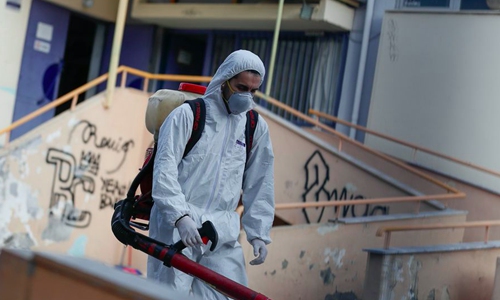HOME >> WORLD
Greece closes borders to non-EU citizens, reports 5th coronavirus death
Source:Xinhua Published: 2020/3/18 9:23:35

A man wearing a protective suit decontaminates a primary school where a child was diagnosed with coronavirus in Thessaloniki, Greece, Feb. 27, 2020.(Photo by Dimitris Tosidis/Xinhua)
The Greek government on Tuesday announced the closure of national borders to non-EU citizens, with exceptions strictly for urgent family or business reasons, starting at 6:00 a.m. local time on Wednesday.
The Deputy Civil Protection Minister Nikos Hardalias said at a press briefing that all foreigners currently in Greece are advised to limit their movements in the country.
No coronavirus case has been confirmed in the country's refugee camps, Hardalias noted.
The Health Ministry said at the press briefing that to date five people have lost his lives to the COVID-19 coronavirus and 35 new cases have been confirmed, bringing the total confirmed cases nationwide to 387.
Seventy people are hospitalized, including 11 in serious condition, Health Ministry spokesperson Sotirios Tsiodras said at the briefing.
All non-emergency operations in private hospitals are suspended, he said.
Shortly before the briefing, Greek Prime Minister Kyriakos Mitsotakis said in a nationally televised address that he was confident that the battle against the novel coronavirus will be won.
Acknowledging that the next two months will be difficult, he urged citizens once again to support the state's efforts to contain the spread of the virus by staying home and complying with all measures.
"We are at war with an enemy invisible, but not invincible. Our first concern is the people and public health. That is why we imposed, sooner than other European countries, measures unprecedented in peacetime. And we will continue along this path," Mitsotakis said.
On Monday, Greek officials said that Greek and EU citizens as well as foreigners living or arriving in the country from abroad must be quarantined for 14 days.
Greece has already shut down schools, universities, restaurants, cafes, shopping malls, gyms and all cultural venues, and from Wednesday all retail stores are also closing, with only bakeries, supermarkets, pharmacies and gas stations remaining open.
Until the end of March, bans and restrictions have been introduced on air and sea connections with several countries, and gatherings at all places of worship have been suspended.
"We have three goals as the war continues: to contain the spread of the virus; to strengthen the health system; and to support the economy and the employees," the Greek PM said.
Around 1,900 additional hospital beds have been made available after two public hospitals and a private medical center are being turned into centers exclusively for the treatment of COVID-19 patients. In addition, 2,000 newly hired medical staff are taking up their posts.
The government has also pledged at least two billion euros (2.2 billion US dollars) to support the economy, asking employers to not eliminate jobs.
Debt repayments to banks by affected businesses will be suspended for six months, and so will payments to the tax office and social security funds as well, the Finance Ministry said.
Against this backdrop, the Eurogroup decided on Monday that the 3.5 percent primary surplus target for 2020 under bailout agreements no longer exists for Greece.
"The biggest weapon against the coronavirus remains our everyday stance. Doctors are telling us anyway that 'We will stand strong at hospitals for you and you should stay at home for us'. In the next two months, the danger will become greater," Mitsotakis said on Tuesday.
"Therefore, more restrictions will follow. And we should all show compliance. Those with an anti-social behavior will be punished. We will win," he stressed. (1 euro = 1.10 US dollars)
Posted in: EUROPE